
Zephaniah 1 is the first chapter of the Book of Zephaniah in the Hebrew Bible or the Old Testament of the Christian Bible. This book contains the prophecies attributed to the prophet Zephaniah, and is a part of the Book of the Twelve Minor Prophets. This chapter contains a call to penitence and oracles against nations, the editorial superscription and the exposition about the day of Yahweh's judgment against the Kingdom of Judah and Jerusalem.

Deuteronomy 22 is the twenty-second chapter of the Book of Deuteronomy in the Hebrew Bible or the Old Testament of the Christian Bible. The book is one of the Books of the Torah. This chapter contains regulations concerning theft of property, protection of life, manners, and violence in sexual relations.
Isaiah 1 is the first chapter of the Book of Isaiah, one of the Book of the Prophets in the Hebrew Bible, which is the Old Testament of the Christian Bible. In this "vision of Isaiah concerning Judah and Jerusalem", the prophet calls the nation to repentance and predicts the destruction of the first temple in the siege of Jerusalem. This chapter provides an introduction to the issues of sin, judgement, and hoped-for restoration which form the overarching structure of the whole book. It concludes with 'a reference to the burning of those who trust in their own strength', in a fire which cannot be 'quenched', a relatively rare word which is also used in the last verse of the book, thereby linking together beginning and ending of this whole book. It is traditionally read on the black sabbath immediately preceding the 9th of Av fast day.

Zephaniah 2 is the second chapter of the Book of Zephaniah in the Hebrew Bible or the Old Testament of the Christian Bible. This book contains the prophecies attributed to the prophet Zephaniah, and is a part of the Book of the Twelve Minor Prophets. This chapter contains a call to penitence and oracles against nations.

Micah 1 is the first chapter of the Book of Micah in the Hebrew Bible or the Old Testament of the Christian Bible. This book contains the prophecies attributed to the prophet Micah, and is a part of the Book of the Twelve Minor Prophets.

Amos 1 is the first chapter of the Book of Amos in the Hebrew Bible or the Old Testament of the Christian Bible. This book contains the prophecies attributed to the prophet Amos, and is a part of the Book of the Twelve Minor Prophets. This chapter contains the prophecies of God's judgments on Syria, Philistia, Tyre, Edom, and Ammon.

Amos 3 is the third chapter of the Book of Amos in the Hebrew Bible or the Old Testament of the Christian Bible. This book contains the prophecies attributed to the prophet Amos, especially God's extraordinary love, being repaid by Israel with ingratitude, of necessity calls for judgments. It is a part of the Book of the Twelve Minor Prophets.
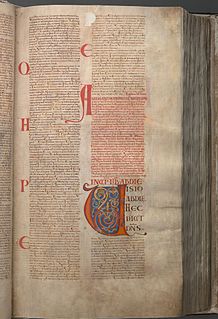
Amos 7 is the seventh chapter of the Book of Amos in the Hebrew Bible or the Old Testament of the Christian Bible. This book contains the prophecies attributed to the prophet Amos; in particular, the seventh, eighth, and ninth chapters contain visions and their explanations. It is a part of the Book of the Twelve Minor Prophets.

Amos 9 is the ninth chapter of the Book of Amos in the Hebrew Bible or the Old Testament of the Christian Bible. This book contains the prophecies attributed to the prophet Amos; in particular, the seventh, eighth, and ninth chapters contain visions and their explanations. It is a part of the Book of the Twelve Minor Prophets.

Hosea 14 is the fourteenth chapter of the Book of Hosea in the Hebrew Bible or the Old Testament of the Christian Bible. This chapter contains the prophecies attributed to the prophet Hosea son of Beeri as an exhortation to repentance and a promise of God's blessing. It is a part of the Book of the Twelve Minor Prophets.

Ruth 1 is the first chapter of the Book of Ruth in the Hebrew Bible or the Old Testament of the Christian Bible, part of the Ketuvim ("Writings"). This chapter contains the story of how Elimelech, Ruth's father-in-law, driven by famine, moved into Moab, and died there ; Naomi returning home, Ruth accompanies her ; They came to Bethlehem.
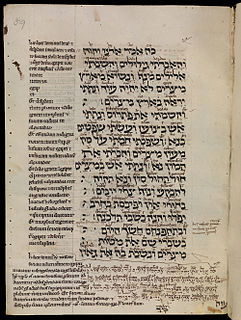
Ezekiel 25 is the twenty-fifth chapter of the Book of Ezekiel in the Hebrew Bible or the Old Testament of the Christian Bible. This book contains the prophecies attributed to the prophet/priest Ezekiel, and is one of the Books of the Prophets. This chapter contains the oracles against four nations: Ammon, Moab, Edom, and Philistia. The prophecies of God's vengeance against these and other foreign nations are recorded in other books of the prophets such as Isaiah, Jeremiah and Amos.

Ezekiel 35 is the thirty-fifth chapter of the Book of Ezekiel in the Hebrew Bible or the Old Testament of the Christian Bible. This book contains the prophecies attributed to the prophet/priest Ezekiel, and is one of the Books of the Prophets. This chapter contains a prophecy against Mount Seir in Edom, to the south of Judah. Biblical commentator Susan Galambush pairs it with an oracle promising "restoration to the mountains of Israel" in the following chapter.
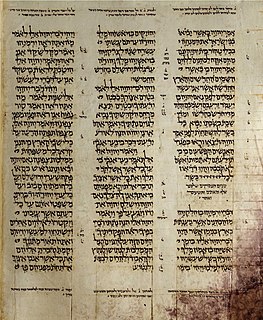
Jeremiah 9 is the ninth chapter of the Book of Jeremiah in the Hebrew Bible or the Old Testament of the Christian Bible. This book contains prophecies attributed to the prophet Jeremiah, and is one of the Books of the Prophets.

Jeremiah 19 is the nineteenth chapter of the Book of Jeremiah in the Hebrew Bible or the Old Testament of the Christian Bible. This book contains prophecies attributed the prophet Jeremiah, and is one of the Books of the Prophets.
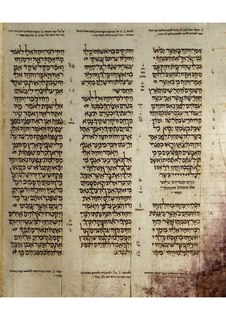
Jeremiah 27 is the twenty-seventh chapter of the Book of Jeremiah in the Hebrew Bible or the Old Testament of the Christian Bible. The material found in Jeremiah 27 is found in Jeremiah 34 in the Septuagint, which orders some material differently. This book contains prophecies attributed to the prophet Jeremiah, and is one of the Books of the Prophets. The New American Bible (NABRE) describes chapters 27-29 as "a special collection of Jeremiah’s prophecies dealing with false prophets", and suggests that "stylistic peculiarities evident in the Hebrew suggest that these three chapters once existed as an independent work".

Jeremiah 48 is the forty-eighth chapter of the Book of Jeremiah in the Hebrew Bible or the Old Testament of the Christian Bible. This book contains prophecies attributed to the prophet Jeremiah, and is one of the Books of the Prophets. This chapter is part of a series of "oracles against foreign nations", consisting of chapters 46 to 51. In particular, chapters 46-49 focus on Judah's neighbors. This chapter contains the poetic oracles against Moab.

2 Kings 3 is the third chapter in the second part of the Books of Kings in the Hebrew Bible or the Second Book of Kings in the Old Testament of the Christian Bible. The book is a compilation of various annals recording the acts of the kings of Israel and Judah by a Deuteronomic compiler in the seventh century BCE, with a supplement added in the sixth century BCE. After a short introduction to the reign of the last king of Israel from the Omride dynasty, Jehoram the son of Ahab, this chapter records the war of the coalition of the kings of Israel, Judah, and Edom, against Mesha the king of Moab with some contribution of Elisha the prophet. Another view of the events in this chapter is notably provided by the inscription on the Mesha Stele made by the aforementioned king of Moab in c. 840 BCE.
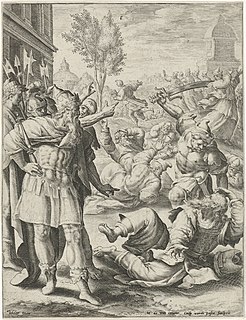
1 Samuel 22 is the twenty-second chapter of the First Book of Samuel in the Old Testament of the Christian Bible or the first part of the Books of Samuel in the Hebrew Bible. According to Jewish tradition the book was attributed to the prophet Samuel, with additions by the prophets Gad and Nathan, but modern scholars view it as a composition of a number of independent texts of various ages from c. 630–540 BCE. This chapter contains the account of David's escape from Saul's repeated attempts to kill him and the massacre of the priests in Nob. This is within a section comprising 1 Samuel 16 to 2 Samuel 5 which records the rise of David as the king of Israel.
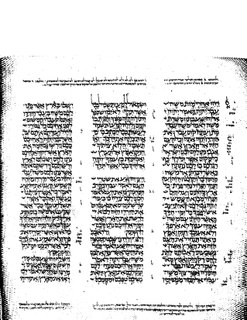
Joshua 5 is the fifth chapter of the Book of Joshua in the Hebrew Bible or in the Old Testament of the Christian Bible. According to Jewish tradition, the book was attributed to the Joshua, with additions by the high priests Eleazar and Phinehas, but modern scholars view it as part of the Deuteronomistic History, which spans the books of Deuteronomy to 2 Kings, attributed to nationalistic and devotedly Yahwistic writers during the time of the reformer Judean king Josiah in 7th century BCE. This chapter focuses on the circumcision and Passover of the Israelites after crossing the Jordan River under the leadership of Joshua, a part of a section comprising Joshua 1:1–5:12 about the entry to the land of Canaan, and the meeting of Joshua with the Commander of the Lord's army near















